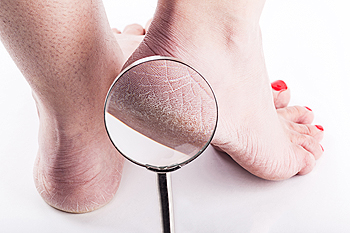
 If you have ever experienced a foot condition that is known as cracked heels, you may be aware of the pain and discomfort that is often associated with it. The skin on the heels often becomes dry and hardened, and this typically indicates that the condition is beginning to develop. There may be several causes for this to occur, including a predisposition to skin conditions, which may include psoriasis or eczema, or other medical maladies such as diabetes or thyroid concerns. If the patient is diabetic, the cracks or fissures may not be felt, which may be due to a condition that is referred to as diabetic neuropathy. This may cause a lack of sensation and any pain and discomfort that is present may not be noticed. If you feel you are developing cracked heels, it’s important to confer with a podiatrist who can advise you on how to properly treat this condition, which may be helpful in attaining maximum comfort.
If you have ever experienced a foot condition that is known as cracked heels, you may be aware of the pain and discomfort that is often associated with it. The skin on the heels often becomes dry and hardened, and this typically indicates that the condition is beginning to develop. There may be several causes for this to occur, including a predisposition to skin conditions, which may include psoriasis or eczema, or other medical maladies such as diabetes or thyroid concerns. If the patient is diabetic, the cracks or fissures may not be felt, which may be due to a condition that is referred to as diabetic neuropathy. This may cause a lack of sensation and any pain and discomfort that is present may not be noticed. If you feel you are developing cracked heels, it’s important to confer with a podiatrist who can advise you on how to properly treat this condition, which may be helpful in attaining maximum comfort.
If the skin on your feet starts to crack, you may want to see a podiatrist to find treatment. If you have any concerns, contact Dr. Harris L. Klear from Burlington County Podiatry Associates. Our doctor can provide the care you need to keep you pain-free and on your feet.
Cracked Heels
It is important to moisturize your cracked heels in order to prevent pain, bleeding, and infection. The reason cracked heels form is because the skin on the foot is too dry to support the immense pressure placed on them. When the foot expands, the dry skin on the foot begins to split.
Ways to Help Heal Them
Ways to Prevent Cracked Heels
If you are unsure how to proceed in treating cracked heels, seek guidance from a podiatrist. Your doctor will help you with any questions or information you may need.
If you have any questions, please feel free to contact one of our offices located in Marlton and Delran, NJ . We offer the newest diagnostic and treatment technologies for all your foot care needs.
Read more about Solutions for Cracked Heels